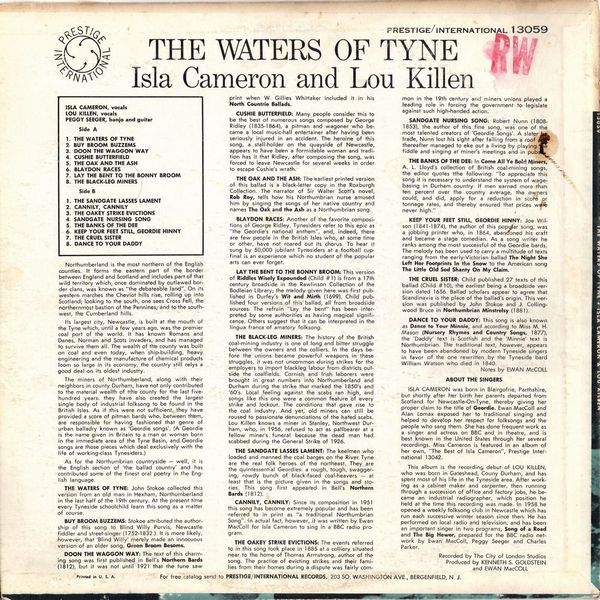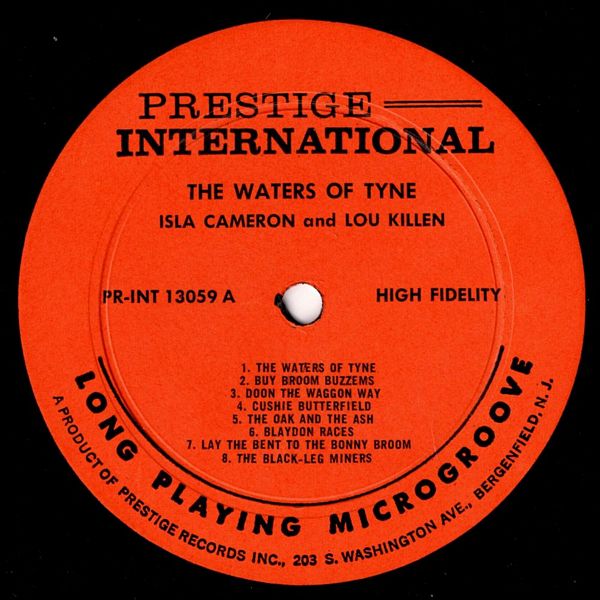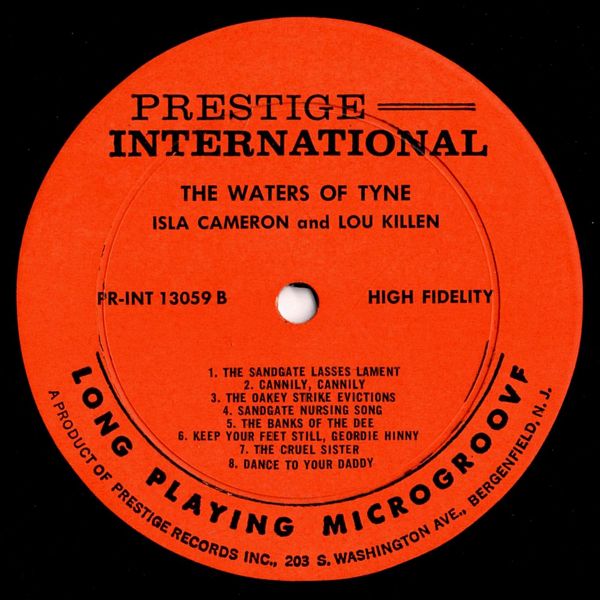

 |


 |
Sleeve Notes
Northumberland is the most northern of the English counties. It forms the eastern part of the border between England and Scotland and includes part of that wild territory which, once dominated by outlawed border clans, was known as "the debatable land". On its western marches the Cheviot hills rise, rolling up into Scotland; looking to the south, one sees Cross Fell, the northernmost bastion of the Pennines; and to the south-west, the Cumberland hills.
Its largest city, Newcastle, is built at the mouth of the Tyne which, until a few years ago, was the premier coal port of the world. It has known Romans and Danes, Norman and Scots invaders, and has managed to survive them all. The wealth of the county was built on coal and even today, when ship-building, heavy engineering and the manufacture of chemical products loom so large in its economy, the country still relys a good deal on its oldest industry.
The miners of Northumberland, along with their neighbors in county Durham, have not only contributed to the material wealth of the county for the last five-hundred years: they have also created the largest single body of industrial folksong to be found in the British Isles. As if this were not sufficient, they have provided a score of pitman bards who, between them, are responsible for having fashioned that genre of urban balladry known as 'Geordie songs'. (A Geordie is the name given in Britain to a man or woman born in the immediate area of the Tyne Basin, and Geordie songs are those pieces which deal exclusively with the life of working-class Tynesiders.)
As for the Northumbrian countryside — well, it is the English section of 'the ballad country' and has contributed some of the finest oral poetry in the English language.
THE WATERS OF TYNE: John Stokoe collected this version from an old man in Hexham, Northumberland in the last half of the 19th century. At the present time every Tyneside schoolchild learn this song as a matter of course.
BUY BROOM BUZZEMS: Stokoe attributed the author-ship of this song to Blind Willy Purvis, Newcastle fiddler and street-singer (1752-1832). It is more likely, however, that 'Blind Willy' merely made an innocuous version of an older song, Green Broom Besoms.
DOON THE WAGGON WAY: The text of this charming song was first published in Bell's Northern Bards (1812), but it was not until 1921 that the tune saw print when W. Gillies Whittaker included it in his North Countrie Ballads.
CUSHIE BUTTERFIELD: Many people consider this to be the best of numerous songs composed by George Ridley (1835-1864), a pitman and wagoner who became a local music-hall entertainer after having been seriously injured in an accident. The heroine of this song, a stall-holder on the quayside of Newcastle, appears to have been a formidable woman and tradition has it that Ridley, after composing the song, was forced to leave Newcastle for several weeks in order to escape Cushie's wrath.
THE OAK AND THE ASH: The 'earliest printed version of this ballad is a black-letter copy in the Roxburgh Collection. The narrator of Sir Walter Scott's novel, Rob Roy, tells how his Northumbrian nurse amused him by singing the songs of her native country and names The Oak and the Ash as a Northumbrian song.
BLAYDON RACES: Another of the favorite compositions of George Ridley. Tynesiders refer to this epic as "the Geordie's national anthem", and, indeed, there are few people in the British Isles who, at some time or other, have not roared out its chorus. To hear it sung by 50,000 jubilant Tynesiders at a football cup-final is an experience which no student of the popular arts can ever forget.
LAY THE BENT TO THE BONNY BROOM: This version of Riddles Wisely Expounded (Child #1) is from a 17th century broadside in the Rawlinson Collection of the Bodleian Library; the melody given here was first published in Durfey's Wit and Mirth (1699). Child published four versions of this ballad, all from broadside sources. The refrain "Lay the bent" has been interpreted by some authorities as having magical significance. Others suggest that it can be interpreted in the lingua franca of amatory folksong.
THE BLACK-LEG MINERS: The history of the British coal-mining industry is one of long and bitter struggle between the owners and the colliers. In the days before the unions became powerful weapons in these struggles, it was not uncommon during strikes for the employers to import blackleg labour from districts outside the coalfields. Cornish and Irish laborers were brought in great numbers into Northumberland and Durham during the strike that marked the 1850's and '60's. Local feeling against the scabs ran high, and songs like this one were a common feature of every strike and lockout. The conditions that gave rise to the coal industry. And yet, old miners can still be roused to passionate denunciations of the hated scabs. Lou Killen knows a miner in Stanley, Northwest Durham, who, in 1956, refused to act as pallbearer at a fellow miner's funeral because the dead man had scabbed during the General Strike of 1926.
THE SANDGATE LASSES LAMENT: The keelmen who loaded and manned the coal barges on the River Tyne are the real folk heroes of the northeast. They are the quintessential Geordies: a rough, tough, swaggering, rowdy bunch of black-faced coal-heavers — at least that is the picture given in the songs and stories. This song first appeared in Bell's Northern Bards (1812).
CANNILY, CANNILY: Since its composition in 1951 this song has become extremely popular and has been referred to in print as "a traditional Northumbrian Song". In actual fact, however, it was written by Ewan MacColl for Isla Cameron to sing in a BBC radio program.
THE OAKEY STRIKE EVICTIONS: The events referred to in this song took place in 1885 at a colliery situated near to the home of Thomas Armstrong, author of the song. The practice of evicting strikes and their families from their homes during a dispute was fairly common in the 19th century an.:..1 miners unions played a leading role in forcing the government to legislate against such high-handed action.
SANDGATE NURSING SONG: Robert Nunn (1808- 1853), the author of this fine song, was one of the most talented creators of 'Geordie Songs'. A slater by trade, Nunn lost his sight after falling from a roof and thereafter managed to eke out a living by playing the fiddle and singing at miner's meetings and in pubs.
THE BANKS OF THE DEE: In Come All Ye Bold Miners, A. L. Lloyd's collection of British coal-mining songs, — the editor quotes the following: "To appreciate this song it is necessary to understand the system of wage-basing in Durham country. If men earned more than ten percent over the country average, the owners could, and did, apply for a reduction in scote or tonnage rates, and thereby ensured that prices were never high."
KEEP YOUR FEET STILL, GEORDIE HINNY: Joe Wilson (1841-1874), the author of this poular song, was a jobbing printer who, in 1864, abandoned his craft and became a stage comedian. As a song writer he ranks among the most successful of the Geordie bards. The melody has been used to carry a multitude of texts ranging from the early-Victorian ballad The Night She Left Her Footprints In the Snow to the American song The Little Old Sod Shanty On My Claim.
THE CRUEL SISTER: Child published 27 texts of this ballad (Child #10), the earliest being a broadside version dated 1656. Ballad scholars appear to agree that Scandinavia is the place of the ballad's origin. This version was published by John Stokoe and J. Coilingwood Bruce in Northumbrian Minstrelsy (1881).
DANCE TO YOUR DADDY: This song is also known as Dance to Your Minnie, and according to Miss M. H. Mason (Nursery Rhymes and Country Songs, 1877), the 'Daddy' text is Scottish and the 'Minnie' text is Northumbrian. The traditional text, however, appears to have been abandoned by modern Tyneside singers in favor of the one rewritten by the Tyneside bard William Watson who died in 1840.
Notes by EWAN McCOLL
ABOUT THE SINGERS
ISLA CAMERON was born in Blairgofrie, Parthshire, but shortly after her birth her parents departed from Scotland for Newcastle-On-Tyne, thereby giving her proper claim to the title of Geordie. Ewan MacColl and Alan Lomax exposed her to traditional singing and helped to develop her respect for folksongs and the people who sang them. She has done frequent work as a singer and actress on BBC and in theatre, and is best known in the United States through her several recordings. Miss Cameron is featured in an album of her own, "The Best of Isla Cameron", Prestige International 13042.
This album is the recording debut of LOU KILLEN, who was born in Gateshead, Couny Durham, and has spent most of his life in the Tyneside area. After working as a cabinet maker and carpenter, then running through a succession of office and factory jobs, he became an industrial radiographer, which position he held at the time this recording was made. In 1958 he opened a weekly folksong club in Newcastle which has run each successive winter season since then. He has performed on local radio and television, and has been an important singer in two programs, Song of a Road and The Big Hewer, prepared for the BBC radio network by Ewan MacColl, Peggy Seeger and Charles Parker.